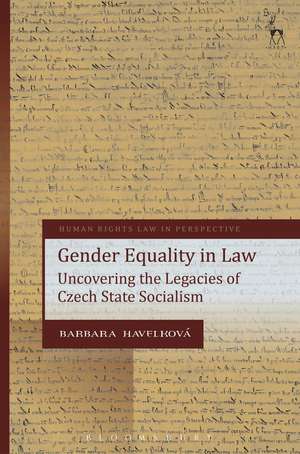Gender Equality in Law: Uncovering the Legacies of Czech State Socialism: Human Rights Law in Perspective
Autor Barbara Havelkováen Limba Engleză Paperback – 30 oct 2019
| Toate formatele și edițiile | Preț | Express |
|---|---|---|
| Paperback (1) | 273.71 lei 6-8 săpt. | +100.97 lei 7-13 zile |
| Bloomsbury Publishing – 30 oct 2019 | 273.71 lei 6-8 săpt. | +100.97 lei 7-13 zile |
| Hardback (1) | 571.99 lei 6-8 săpt. | |
| Bloomsbury Publishing – 31 mai 2017 | 571.99 lei 6-8 săpt. |
Din seria Human Rights Law in Perspective
- 30%
 Preț: 571.99 lei
Preț: 571.99 lei - 28%
 Preț: 376.06 lei
Preț: 376.06 lei - 22%
 Preț: 251.39 lei
Preț: 251.39 lei - 30%
 Preț: 510.68 lei
Preț: 510.68 lei - 18%
 Preț: 305.53 lei
Preț: 305.53 lei -
 Preț: 357.30 lei
Preț: 357.30 lei - 23%
 Preț: 187.33 lei
Preț: 187.33 lei - 30%
 Preț: 511.72 lei
Preț: 511.72 lei - 24%
 Preț: 189.87 lei
Preț: 189.87 lei - 28%
 Preț: 495.80 lei
Preț: 495.80 lei - 14%
 Preț: 541.28 lei
Preț: 541.28 lei - 28%
 Preț: 498.33 lei
Preț: 498.33 lei - 30%
 Preț: 569.29 lei
Preț: 569.29 lei - 28%
 Preț: 435.66 lei
Preț: 435.66 lei - 30%
 Preț: 571.16 lei
Preț: 571.16 lei - 30%
 Preț: 569.06 lei
Preț: 569.06 lei - 30%
 Preț: 574.10 lei
Preț: 574.10 lei - 30%
 Preț: 514.01 lei
Preț: 514.01 lei - 28%
 Preț: 499.58 lei
Preț: 499.58 lei - 20%
 Preț: 220.75 lei
Preț: 220.75 lei - 30%
 Preț: 539.84 lei
Preț: 539.84 lei - 11%
 Preț: 498.73 lei
Preț: 498.73 lei - 22%
 Preț: 253.58 lei
Preț: 253.58 lei - 22%
 Preț: 265.00 lei
Preț: 265.00 lei - 18%
 Preț: 300.90 lei
Preț: 300.90 lei - 18%
 Preț: 355.76 lei
Preț: 355.76 lei - 18%
 Preț: 298.25 lei
Preț: 298.25 lei - 18%
 Preț: 298.43 lei
Preț: 298.43 lei - 28%
 Preț: 466.39 lei
Preț: 466.39 lei -
 Preț: 308.74 lei
Preț: 308.74 lei - 28%
 Preț: 375.61 lei
Preț: 375.61 lei - 34%
 Preț: 509.52 lei
Preț: 509.52 lei
Preț: 273.71 lei
Preț vechi: 349.71 lei
-22% Nou
Puncte Express: 411
Preț estimativ în valută:
52.38€ • 54.79$ • 43.51£
52.38€ • 54.79$ • 43.51£
Carte tipărită la comandă
Livrare economică 02-16 aprilie
Livrare express 26 februarie-04 martie pentru 110.96 lei
Preluare comenzi: 021 569.72.76
Specificații
ISBN-13: 9781509933037
ISBN-10: 1509933034
Pagini: 368
Dimensiuni: 156 x 234 x 17 mm
Greutate: 0.51 kg
Editura: Bloomsbury Publishing
Colecția Hart Publishing
Seria Human Rights Law in Perspective
Locul publicării:London, United Kingdom
ISBN-10: 1509933034
Pagini: 368
Dimensiuni: 156 x 234 x 17 mm
Greutate: 0.51 kg
Editura: Bloomsbury Publishing
Colecția Hart Publishing
Seria Human Rights Law in Perspective
Locul publicării:London, United Kingdom
Caracteristici
Goes beyond doctrinal analysis to offer an analysis and critique of local understandings of concepts such as 'gender' and 'equality'.
Notă biografică
Barbara Havelková is the Shaw Foundation Fellow in Law at the University of Oxford.
Cuprins
1. Introduction Part I: State Socialism2. The Three Stages of Regulation of Women and Gender 3. State-Socialist Law and Rights 4. Equality as Socio-Economic Levelling 5. Blindness to Gender and Patriarchy Part II: Post-Socialism6. Women and Gender After 1989 7. Post-Socialist Law and Rights 8. Equality and Anti-Discrimination after 1989: Resisting the Ideas and the Legal Concepts 9. Wanted: Gender and Feminism 10. Conclusions
Recenzii
This is the first book since 1989 to apply a feminist and critical studies methodology to the legal system of a CEE country. It is therefore indispensable to any scholar writing about gender and equality in CEE and a must-read for anyone with an interest in understanding the CEE legal culture(s) and societies.
This book is an excellent work of feminist legal genealogy, bringing a useful contribution towards our understanding of the relationship of equality, gender and the law, as well as discrimination and rights. It also shows the limited impact of anti-discrimination law if it is not underpinned by general social acceptance of the need for gender equality in all spheres, something that the current #MeToo campaign has made relevant also in the West.
What Havelková sets in train ... is a thorough engagement with feminist legal materials to trouble conventional accounts of EU implementation in recent accession states. Her book is methodologically distinctive, offering a fluid blend of archival analysis, doctrinal excavation (both domestic and EU), and socio-political theory. Her resulting contribution to scholarly literature through this monograph is undoubtedly fascinating and remarkably broad.
Since the fall of the Berlin wall there has been a surprising dearth of high quality of scholarship on legal culture in the communist successor states of East Central Europe. In this excellent book Barbara Havelkova engages with the reversal of many of the advances the socialist period made in gender relations, examining the historical roots of the current failure of Czech law to engage with the discriminatory practices that have negatively affected the lives of women. She does this by a forensic excavation of law, discourses and practices of the socialist era revealing the patriarchal assumptions underpinning them that became deeply embedded in Czech legal culture, and that have been carried forward to the present day. The book is a compelling read. It provides answers to many of the questions that have perplexed feminists about the post-soviet transition and at the same time speaks more generally to the debates surrounding the troubling rightward shift in the politics of the communist successor states of Europe.
In Gender Equality in Law: Uncovering the Legacies of Czech State Socialism, Barbara Havelková offers a sober and sophisticated socio-legal account of gender equality law in Czechia. Tracing gender equality norms from their origins under state socialism, Havelková shows how the dominant understanding of the differences between women and men as natural and innate combined with a post-socialist understanding of rights as freedom to shape the views of key Czech legal actors and to thwart the transformative potential of EU sex discrimination law. Havelková's compelling feminist legal genealogy of gender equality in Czechia illuminates the path dependency of gender norms and the antipathy to substantive gender equality that is common among the formerly state-socialist countries of Central and Eastern Europe. Her deft analysis of the relationship between gender and legal norms is especially relevant today as the legitimacy of gender equality laws is increasingly precarious
This book is an excellent work of feminist legal genealogy, bringing a useful contribution towards our understanding of the relationship of equality, gender and the law, as well as discrimination and rights. It also shows the limited impact of anti-discrimination law if it is not underpinned by general social acceptance of the need for gender equality in all spheres, something that the current #MeToo campaign has made relevant also in the West.
What Havelková sets in train ... is a thorough engagement with feminist legal materials to trouble conventional accounts of EU implementation in recent accession states. Her book is methodologically distinctive, offering a fluid blend of archival analysis, doctrinal excavation (both domestic and EU), and socio-political theory. Her resulting contribution to scholarly literature through this monograph is undoubtedly fascinating and remarkably broad.
Since the fall of the Berlin wall there has been a surprising dearth of high quality of scholarship on legal culture in the communist successor states of East Central Europe. In this excellent book Barbara Havelkova engages with the reversal of many of the advances the socialist period made in gender relations, examining the historical roots of the current failure of Czech law to engage with the discriminatory practices that have negatively affected the lives of women. She does this by a forensic excavation of law, discourses and practices of the socialist era revealing the patriarchal assumptions underpinning them that became deeply embedded in Czech legal culture, and that have been carried forward to the present day. The book is a compelling read. It provides answers to many of the questions that have perplexed feminists about the post-soviet transition and at the same time speaks more generally to the debates surrounding the troubling rightward shift in the politics of the communist successor states of Europe.
In Gender Equality in Law: Uncovering the Legacies of Czech State Socialism, Barbara Havelková offers a sober and sophisticated socio-legal account of gender equality law in Czechia. Tracing gender equality norms from their origins under state socialism, Havelková shows how the dominant understanding of the differences between women and men as natural and innate combined with a post-socialist understanding of rights as freedom to shape the views of key Czech legal actors and to thwart the transformative potential of EU sex discrimination law. Havelková's compelling feminist legal genealogy of gender equality in Czechia illuminates the path dependency of gender norms and the antipathy to substantive gender equality that is common among the formerly state-socialist countries of Central and Eastern Europe. Her deft analysis of the relationship between gender and legal norms is especially relevant today as the legitimacy of gender equality laws is increasingly precarious
















